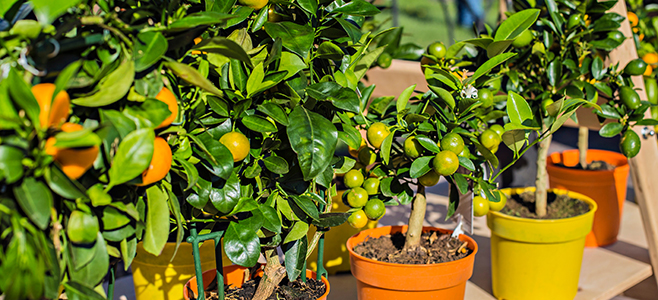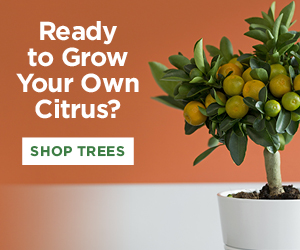
One of the most exciting gardening trends in recent decades has been the growing popularity of small-space gardening for growing fruits and vegetables. Many home gardeners have learned you don’t need much space to grow all kinds of vegetables, fruits and herbs – and that now includes tree fruits.
Whether you plant them in the ground or keep them indoors part or all of the time in a large container, dwarf cultivars of certain kinds of fruit trees can add interest to your landscape, scent your home and garden with fragrant blooms, and even yield edible produce. Even better, many dwarf variety fruit trees (like a dwarf tangerine tree, dwarf grapefruit trees, and other citrus varieties) are self-fertile, meaning they don’t rely on another tree to cross-pollinate with to produce fruit – thus saving you even more space.
But how can you be sure that your dwarf citrus trees’ size remains manageable? Do dwarf trees truly remain small?
What is a “Dwarf” Tree?
Growing a fruit tree in your yard doesn’t demand sacrificing space for a patio or play area. Many dwarf fruit trees require only an 8-foot-diameter space – and some thrive in even less, fitting in a pot on a patio.
Dwarf trees are the result of using the centuries-old horticulture technique of grafting a fruit tree onto a dwarf tree rootstock. The resulting cultivar produces normal-sized fruit, while the rootstock controls the height and spread of the tree. A dwarf citrus tree’s size generally stays anywhere from six to twelve feet tall, depending on whether you plant it in the ground or in a container, the size of the container, and whether or not you prune it regularly.
When seeking out a dwarf tree to plant outdoors, be sure you purchase your tree from a reputable vendor that employs knowledgeable horticulturists, and don’t be afraid to ask questions. Otherwise, you could end up with a tree that’s not truly a dwarf variety that will eventually outgrow the space. You don’t have to shop for dwarf citrus trees for sale in Florida, either; reputable companies like Citrus.com will do the work for you in finding the perfect tree for your taste and space.
What are the Benefits of Growing a Dwarf Fruit Tree
Well, the first and most obvious benefit of growing a dwarf fruit tree is that it makes homegrown fruit available to amateur gardeners who would otherwise be unable to keep such trees, either due to property size or climate. Homeowners who live in colder climates, for instance, might expect that growing their own citrus tree would be impossible, but dwarf varieties of many citrus trees (including an orange, lemon, or dwarf kumquat tree) give such would-be gardeners the option of keeping their tree in a pot full time overwintering it indoors.
In addition to their smaller size and portability, it’s easier to harvest fruit from a dwarf citrus tree, and easier to protect it from pests. Even better, with the right care dwarf citrus trees tend to bear fruit 1-3 years earlier than standard trees and produce more fruit per area.
Whether you intend to plant your tree in the ground or in a container, be sure to choose a location with full sun and good drainage.
What Dwarf Citrus Trees are Good to Grow at Home?
Interested in starting your own garden of potted fruit trees, but not sure where to begin? Here are a few varieties that will adapt to your circumstances and provide you with fresh fruit and a feel of the tropics all year:
- Bearrs Lime. If you’re looking for the best dwarf lime tree, you can’t go far wrong with a Bearrs (AKA Persian) Lime. Great for cooking or making cocktails, the fruit is similar to what you’d find in the grocery store.
- Meyer Lemon. Lemon trees grow very well indoors, and the Meyer Lemon is one of the best. Small and bushy, it’s a lovely plant that scents the air around it with a wonderful, fresh, citrus-y smell. The fruit is sweeter than true lemons and makes wonderful lemonade.
- Tangerine. Tangerines are always a hit with the lunchbox set because the fruit is small, sweet, and easy to peel. The tree is also small and a great choice for a sunroom or balcony. When kept indoors, the tree may produce fruit year-round.
- Kumquat. Kumquats are small, thin-skinned fruits that you eat whole, like grapes. They have a wonderful flavor and make an exotic treat! The dwarf kumquat tree is cold hardy so it can live outdoors for part of the year, and very resistant to pests, too.

